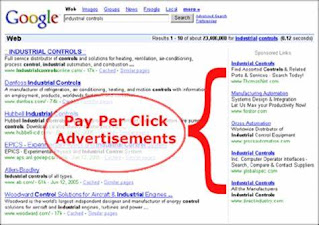Pay Per Clicks using by google ADS
The pay-per-click (PPC) model is the primary advertising
model used by Google Ads. With this model, businesses only pay when someone
clicks on their ad. This means that businesses are only charged when a user
interacts with their ad by clicking on it, rather than simply being charged for
the ad being displayed.
When a business creates a Google Ads campaign, they set a
maximum bid for each keyword they target. This bid represents the maximum
amount the business is willing to pay each time someone clicks on their ad.
Google Ads then uses a bidding system to determine which ads are displayed to
users based on the relevance and quality of the ad and the bid amount.
For example, if a business bids $1 for a keyword, and a user
clicks on their ad, the business will be charged $1. However, if another
business bids $1.50 for the same keyword, and their ad is clicked on, they will
be charged $1.50.
The PPC model used by Google Ads allows businesses to
control their advertising spend and target specific audiences. It also provides
businesses with a clear and measurable return on investment (ROI), as they can
track the number of clicks, conversions, and revenue generated from their ad
campaigns.
Overall, the PPC model used by Google Ads is an effective
way for businesses to reach their target audience and generate leads, while
only paying for the results they achieve.
The pay-per-click (PPC) system used by Google Ads is a form
of online advertising where businesses only pay when someone clicks on their
ad. With PPC advertising, businesses bid on specific keywords and target
audiences, and their ads are displayed on Google's search engine results pages
(SERPs) and other Google partner websites.
Here's how it works:
1. Businesses create a Google Ads account and select the
campaign type they want to run, such as a search campaign, display campaign, or
shopping campaign.
2. They choose their target audience and select the keywords
they want to bid on. For example, a business selling running shoes may bid on
keywords such as "running shoes," "athletic footwear," or
"best running shoes."
3. Businesses set a maximum bid for each keyword they
target, which represents the most they are willing to pay each time someone
clicks on their ad.
4. Google Ads uses a bidding system to determine which ads
are displayed to users based on the relevance and quality of the ad and the bid
amount. Google Ads takes into account several factors, such as the ad's
relevance to the search query, the quality of the ad, and the bid amount.
5. When a user clicks on an ad, the business is charged the
amount they bid for that keyword. For example, if a business bids $1 for a
keyword, and a user clicks on their ad, the business will be charged $1.
The PPC model used by Google Ads offers several benefits for
businesses:
1. Cost-effective: With PPC advertising, businesses only pay
when someone clicks on their ad, which can be a more cost-effective way to
reach their target audience compared to traditional advertising.
2. Targeted: Google Ads offers advanced targeting options,
allowing businesses to target specific audiences based on demographics,
interests, and behaviors.
3. Measurable: Google Ads provides businesses with tools to
track and measure the performance of their campaigns, including click-through
rates (CTR), conversion rates, and return on ad spend (ROAS). This can help
businesses identify which ads are most effective and optimize their campaigns
for better results.
4. Control: The PPC model used by Google Ads gives
businesses control over their advertising spend and allows them to adjust their
bids and budgets as needed.
In conclusion, the pay-per-click (PPC) system used by Google
Ads is an effective way for businesses to reach their target audience and
generate leads, while only paying for the results they achieve. By carefully
selecting keywords, targeting specific audiences, and optimizing their
campaigns for better performance, businesses can achieve a high return on
investment (ROI) with Google Ads.



Comments
Post a Comment